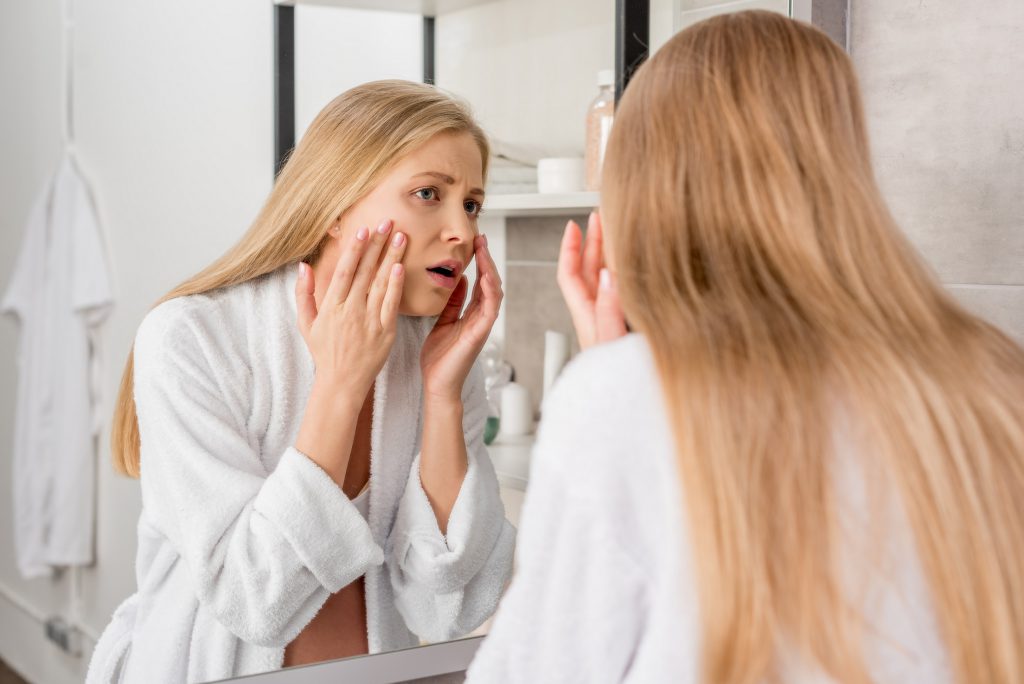Note: The Pregistry website includes expert reports on more than 2000 medications, 300 diseases, and 150 common exposures during pregnancy and lactation. For the topic Rosacea, go here. These expert reports are free of charge and can be saved and shared.
__________________________________
Learning to love your new pregnancy body and baby bump can be tough. The stretch marks, dimples, pimples, and dry patches are a part of what your body takes in stride to grow the living miracle inside of you. However, sometimes the changes your body can go through may not only make you self-conscious but can be uncomfortable as well. Rosacea is a common skin condition that causes redness and visible blood vessels in your face. It may also produce small, red, pus-filled bumps. These signs and symptoms may flare up for weeks to months and then go away for a while. Rosacea can be mistaken for acne, other skin problems, or natural ruddiness. Rosacea can result in the feeling of skin tightness, itchiness, and overall discomfort.
Many women develop rosacea during pregnancy. Don’t worry, you are not alone! During pregnancy, your body is flooded with hormones which can lead to skin conditions being exacerbated or even appearing for the very first time. You may notice your skin getting more dry, more oily, more sensitive, or you may even be the lucky few who happen to experience the ‘pregnancy glow’.
The real question is how do you manage your pregnancy-induced rosacea? We have out together a list of suggestions that can help mitigate your symptoms! It is important to remember to always consult your health care practitioner if you feel as though you may have a serious condition.
Drinking plenty of water throughout the day can reduce the dryness that rosacea causes while avoiding hot meals during the daytime can keep skin cool and calm while you’re on the go.
- Nix refined sugar and carbs!
Recent clinical studies and research show that consuming sugar and refined carbohydrates (high on the glycemic index or GI scale) creates more free radicals and can damage your collagen resources. Big portions of high GI foods also burn energy quickly, producing heat in the body and skin, thereby speeding up the ageing process. Low GI foods, on the other hand, help protect your skin from damage by keeping cell inflammation to a minimum. This is particularly good news for acne and rosacea sufferers whose skin is often irritated below the surface.
- Spread your meals out.
Rather than eating three meals a day, I tend to opt for five or six small portions to allow my body to keep inflammation and ‘flush’ to a minimum. This method is also great for avoiding post-meal energy dips, which often leave us feeling tired and groggy. Drinking plenty of water throughout the day can reduce the dryness that rosacea causes while avoiding hot meals during the daytime can keep skin cool and calm while you’re on the go.
- Cut the caffeine!
As a stimulant, when caffeine surges into the body it stimulates your adrenal glands to produce, amongst other things, adrenaline and then it sets into motion a series of chemical triggers and reactions. This releases cortisol which signals for a massive increase in blood sugar levels, causing a huge inflammatory state in the whole body and specifically the skin. Prolonged and sustained stimulation of the adrenal glands can lead to a suppression of the reproductive, immune, and digestive systems which, as you can imagine, is not just catastrophic for the skin but is also thought to contribute to a number of other health issues. Thus, there are lots of reasons to choose decaffeinated options whenever possible. Even if you are having only one small cup of coffee because of baby, try and remove that caffeine from your schedule!

- Moisturize carefully!
It is super important that you moisturize. However, it is even more imperative that you don’t use any skin care that contains alcohol (ethanol). Always check the ingredients list–it is used a lot.

